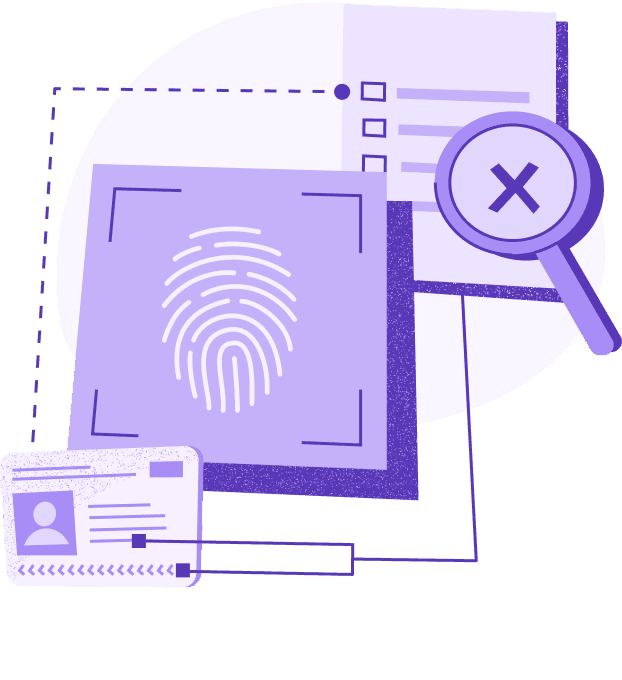Article
3 min read
A Guide to Employee Background Checks in Denmark
Employee background checks

Author
Michał Kowalewski
Last Update
January 31, 2025

Table of Contents
Essential information for a background check in Denmark
Are background checks legal in Denmark?
What types of background checks are illegal in Denmark?
Common background check industries
Common Checks and Less Common Checks
Background check mistakes to avoid in Denmark
Step-by-step guide of employee background checks in Denmark
Run employee background checks with Deel
Key takeaways
- Employee background checks are a common step in the hiring process for many roles in Denmark.
- While commonly used, background checks are heavily regulated, both by European (GDPR) as well as Danish law
- Data privacy is an important principle that guides what is allowed, or prohibited when it comes to employee background checks.
Employee background checks should be an integral part of your hiring process in Denmark. Although not mandatory, they are a common practice, especially in finance, healthcare, education, security, law enforcement, and the public sector.
Denmark is one of the easiest countries to conduct business in, and one of the most competitive markets. These qualities, packed in a small country with a population of almost 6 million people, mean that competition for specialized jobs is high, as is the need to ensure potential candidates are the best for the role.
In Denmark, the practice of conducting employee background checks has become an integral part of the recruitment process for many businesses. This crucial step is not just about vetting potential employees; it's about ensuring the safety, integrity, and trustworthiness of the work environment. With the Danish job market being highly competitive and diverse, the impact of effective background checks on hiring decisions cannot be overstated.
In this article, you’ll learn:
- How to run an effective and legal employment screening in Denmark
- What the common types of employee checks are in Denmark
- How to conduct a thorough employee screening, step by step
- What mistakes to avoid when performing a background check in Denmark
Essential information for a background check in Denmark
Denmark's approach to privacy and data protection is stringent, governed by the General Data Protection Regulation (GDPR) and local laws such as the Danish Data Protection Act. The Danish Data Protection Agency (Datatilsynet) plays a crucial role in overseeing compliance with these regulations. When conducting background checks in Denmark, employers must obtain explicit consent from the candidate before initiating any process, and ensure that the information collected is directly relevant to the job's requirements.
The GDPR is at the core of compliant background checks in Denmark. A good understanding of its provisions and mandates is essential for businesses wishing to work in the country, as they inform other data-related regulations specific to Denmark. According to the Danish Act on Processing of Personal Data, there are three levels of personal data, each with its own regulations:
- Sensitive information
- Information regarding other purely private conditions
- Ordinary non-sensitive information
Understanding how data is classified is vital to processing it correctly and compliantly.
- The authority in charge of managing data compliance and enforcing regulations in the country is the [Danish Data Protection Agency] (https://www.datatilsynet.dk/)(Datatilsynet).
- While Datatilsynet is not allowed to issue fines or penalties, this means that data violations are managed directly by the national justice system.
Are background checks legal in Denmark?
Yes, background checks are legal in Denmark, but they are subject to strict regulations to protect individuals' privacy rights. Employers must adhere to the principles of transparency, necessity, and proportionality outlined in the GDPR and the Danish Data Protection Act. This means that any background check conducted must be justified by the nature of the job and limited to information that is essential for assessing the candidate's suitability.
Background checks
What types of background checks are illegal in Denmark?
Certain types of background checks are restricted or considered illegal in Denmark, especially those that infringe on an individual's privacy without a legitimate reason. For instance: Accessing a candidate's medical records or checking their private social media accounts without consent is prohibited.
- Credit or financial history checks are unlawful unless specifically required for the role.
- Medical history checks and drug screenings are only allowed if specifically required for the role.
- Conducting background checks that could lead to discrimination, such as those based on race, religion, or sexual orientation is prohibited.
Common background check industries
- Finance and banking: Due to the sensitive nature of transactions in this market, background checks are common for potential candidates.
- Education: Potential employees in the education sector are often screened to ensure their qualifications meet the quality of educational delivery in the country, and to ensure there have been no issues relating to abuse or mistreatment of minors.
- Healthcare: Given the critical nature of healthcare services, employee background checks are common in this sector, to ensure qualifications are confirmed, and that there are no past issues with malpractice or similar liabilities.
- IT and cybersecurity: Background checks are common in these industries given the importance of intellectual property and of data processing and protection.
Common Checks and Less Common Checks
| Type of Check | Common in Denmark | Reason |
|---|---|---|
| Criminal record check | Common | Ensure the candidate has no criminal history relevant to the position, especially in sensitive sectors like finance or childcare. |
| Employment verification | Common | Confirm previous employment history and experience to prevent resume fraud. |
| Education verification | Common | Verify academic credentials to ensure authenticity, particularly for professional and specialized roles. |
| Reference check | Common | Assess the candidate’s previous job performance, reliability, and suitability for the role. |
| Credit check | Less common | Used primarily for roles involving financial responsibility to assess financial stability. |
| Health and medical checks | Less common | Required for specific roles to ensure the candidate is physically fit for the job. |
| Social media screening | Less common | Evaluate the candidate’s online presence and behavior to ensure alignment with company values and public image. |
Criminal record checks and employment history verifications are among the most common checks in Denmark, primarily due to their direct relevance to most job roles. Less common checks, such as social media screening and medical records, are restricted due to privacy concerns.
Background check mistakes to avoid in Denmark
Whether you’re hiring employees or contractors in Denmark, there are a few things you shouldn’t do as an employer when it comes to background checks:
- Neglecting consent: Failing to obtain explicit consent from the candidate can lead to legal repercussions.
- Overreaching scope: Conducting checks not relevant to the job's requirements is a violation of privacy laws.
- Ignoring candidate feedback: Not allowing candidates to discuss or clarify adverse findings can lead to unfair hiring practices.
- Poor record keeping: Inadequate documentation of the consent and background check process can result in non-compliance with GDPR.
Step-by-step guide of employee background checks in Denmark
- Determine scope: Clearly define what aspects of the candidate's background will be checked, ensuring it's relevant to the job.
- Obtain consent: Begin by informing the candidate about the background check and obtaining their written consent.
- Notify candidate: Inform the candidate about the specific checks being conducted and the reasons behind them.
- Conduct checks: Proceed with the agreed-upon checks, such as criminal record checks, educational verification, and previous employment verification.
- Evaluate information: Assess the information collected, focusing on its relevance to the job's requirements.
- Respect privacy: Ensure that any personal information not related to the job is disregarded and not recorded.
- Provide feedback to candidate: Provide the candidate with an opportunity to discuss any adverse findings.
- Make a decision: Use the background check information, along with other assessment criteria, to make an informed hiring decision.
- Keep records: Keep records of the consent and background check process, in compliance with GDPR.
- Ensure continuous compliance: Regularly review your background check process to ensure it remains compliant with Danish law.
Run employee background checks with Deel
There’s no need for HR to log into yet another platform or manually chase documents. With screenings in over 200 countries and territories (and counting), for employees and contractors, you can manage background checks for global hires with a single source of truth without leaving the Deel platform.
Are you looking for an easy and safe way to run a background check?

About the author
Michał Kowalewski a writer and content manager with 7+ years of experience in digital marketing. He spent most of his professional career working in startups and tech industry. He's a big proponent of remote work considering it not just a professional preference but a lifestyle that enhances productivity and fosters a flexible work environment. He enjoys tackling topics of venture capital, equity, and startup finance.
















